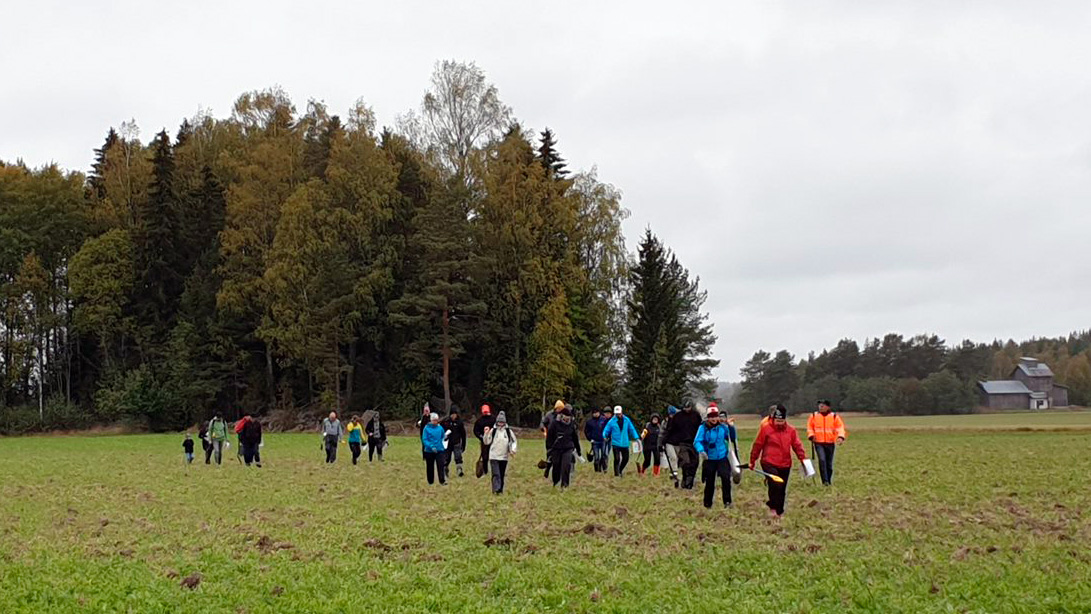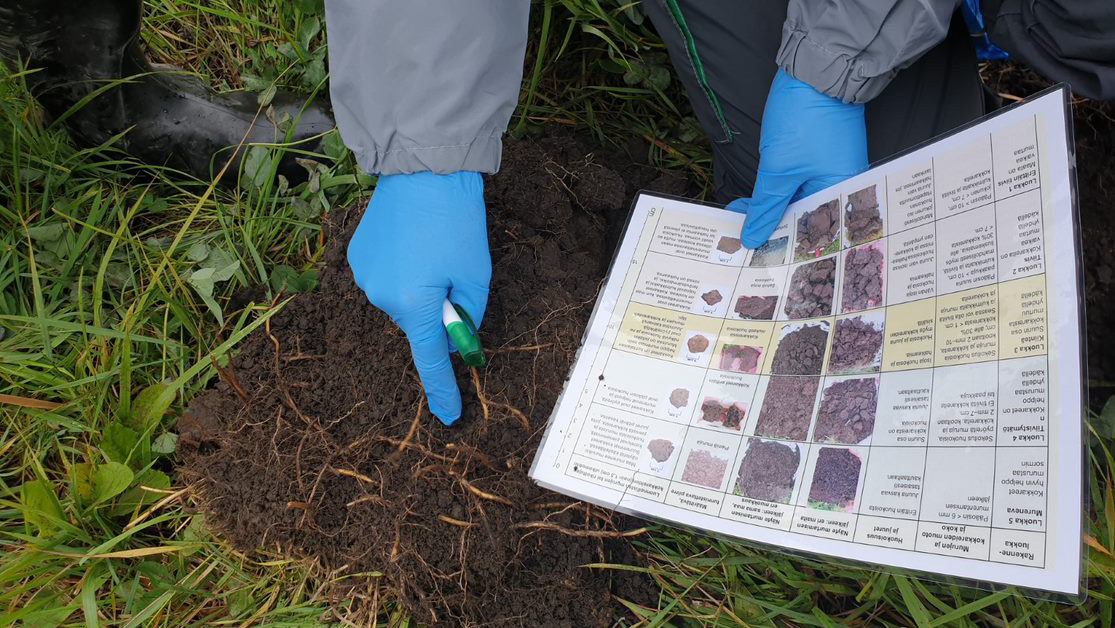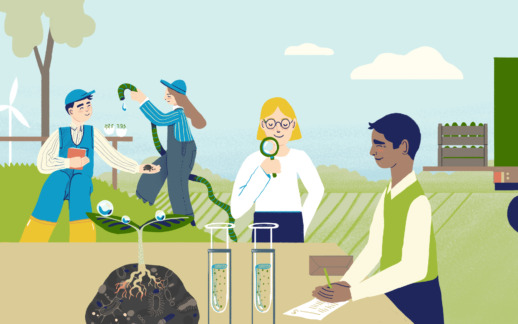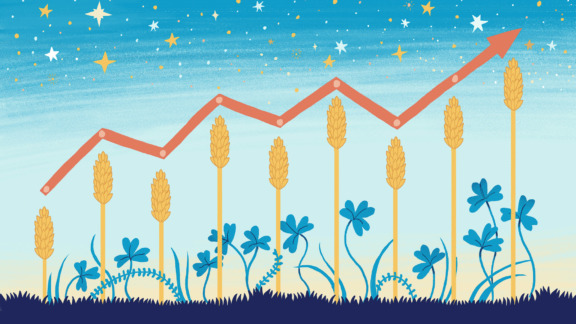Mainstreaming regenerative agriculture by training agricultural advisors in soil health – experiences from Finland
Agricultural advisors play a key role in transferring new information to farmers and helping them to implement it. Training agricultural advisors in soil health eliminates a major bottleneck in the process of mainstreaming regenerative agriculture.
WHAT?
Training agricultural advisors to become top experts in soil health
WHO?
Agricultural advisors
WHEN?
2020–2022, two-year training
WHY?
Widespread and fast adoption of evidence-based regenerative farming practices is needed to address the eutrophication of waters, biodiversity loss, and climate change.
The first advisors in Finland to specialise in soil management and carbon farming completed an in-depth training organised by the Carbon Action platform in 2022. By helping farmers to improve their soils, these top experts enable farmers to produce better yields in an environmentally friendly way.
In Finland, the set of available advisory services is diverse; there are advisory organizations, private advisors, and many agri-environmental projects which offer farmers advice. There are several routes to becoming an advisor. Therefore, not all advisors have in-depth knowledge of soil health.
“We have recognised that the lack of agricultural advisors trained specifically in soil health is a bottleneck in implementing scientifically-backed carbon farming measures on farms”, says Eija Hagelberg, Project Director at Baltic Sea Action Group.
The project ‘Sustainable soil management and carbon farming through the extensive use of research findings and advisor practices’, SOIL ADVICE -project for short, ran from 2019 to 2022 and aimed to close the gap between carbon farming science and practice through holistic training of plant production advisors.

Gaining strong expertise in soil management requires thorough training
The SOIL ADVICE -training was carried out with blended learning, consisting of practical field study days, online lessons, exercises, and peer learning. Each advisor also made a soil management plan for an existing farm.
The key topics of the training included monitoring soil health at the farm level, recognising the current state of soil, identifying the parcel-specific soil problems and solutions to them, and monitoring the development of soil health.
“I have worked with things related to soil structure and soil fertility for nearly 30 years. Even so, I developed my expertise into the next level and learned many new tools to support my work”, Kaija Hinkkanen from the advisory organization ProAgria Southern Finland says.
In the two-year training, there was time to go into details, too. The advisors learned, for instance, how to reduce the soil compaction risk by choosing more suitable wheels for agricultural devices, and how to use map data to locate the soil problems.
Topics of the training
Locating soil problems by using satellite images and other map data
There is plenty of free and easily accessible map data which can be used to quickly recognise soil and productivity-related problems in fields.
Visual evaluation of soil structure (VESS)
The international VESS test is based on the appearance and feel of a soil sample taken with a spade and a comparison of the observations with standardised characteristics of soil.
Assessment of the soil drainage condition
Poor soil drainage is a reason behind many soil structure problems. Assessment of the soil drainage condition requires investigating the field drainage system and finding out whether this system works or not.
Extended analysis of soil fertility research
Recognition of cation exchange capacity is a basis for managing soil chemical fertility. Understanding the plot-specific soil properties helps in planning the liming and the use of other soil amendments.
Scanning the risks for soil compaction and planning how to reduce the risks
Soil compaction reduces the soil’s productivity substantially. Planning the field traffic and the tyres of agricultural devices properly and using lower tyre pressure reduce the risk of compaction.
Planning crop rotations which boost soil health
Diverse crop rotations boost the soil health through diverse root architectures.
Making a holistic soil management plan
All the previous tasks should be considered when planning the farm-specific soil management.

Advisors are key players in sharing knowledge about soil
The SOIL ADVICE training concept can be used elsewhere, too, Jukka Rajala from the University of Helsinki Ruralia Institute believes. “Also in other countries, there is certainly a need for this kind of holistic understanding about soil health”.
Rajala has had a decades-long career as an expert in sustainable soil management and as a trailblazer in organic farming in Finland. In SOIL ADVICE -training he coached the advisors together with farmer-researcher Tuomas Mattila from the Finnish Environment Institute.
“First, carrying out a course like SOIL ADVICE requires professional educators who know both the theory and the practical implementations on farms. Second, it requires motivated advisors ready to engage in long-term training and to learn new things in theory and practice. Third, it requires funding”, Rajala sums up.
In the current rural development programme in Finland (RDP 2014–2020), there is a measure, called “Neuvo2020”, through which farmers can use advisory services worth 15 000 euros between the years 2015 and 2022 by paying only the value-added tax of the service. The measure includes advisory about different subjects, such as soil management, environment, and economy.
The forthcoming Finnish rural development programme includes a similar measure, Neuvo2030, which pays more attention to soil health. The demand for agricultural advisors knowledgeable in soil health will grow further, which means more advisors must be trained regularly.
SOIL ADVICE project is funded by Maa- ja vesitekniikan tuki ry (in English: Support association for soil and water technologies) and carried out by BSAG, Finnish Environment Institute (SYKE), University of Helsinki Ruralia Institute and ProAgria Southern Finland.
CONTACT US




